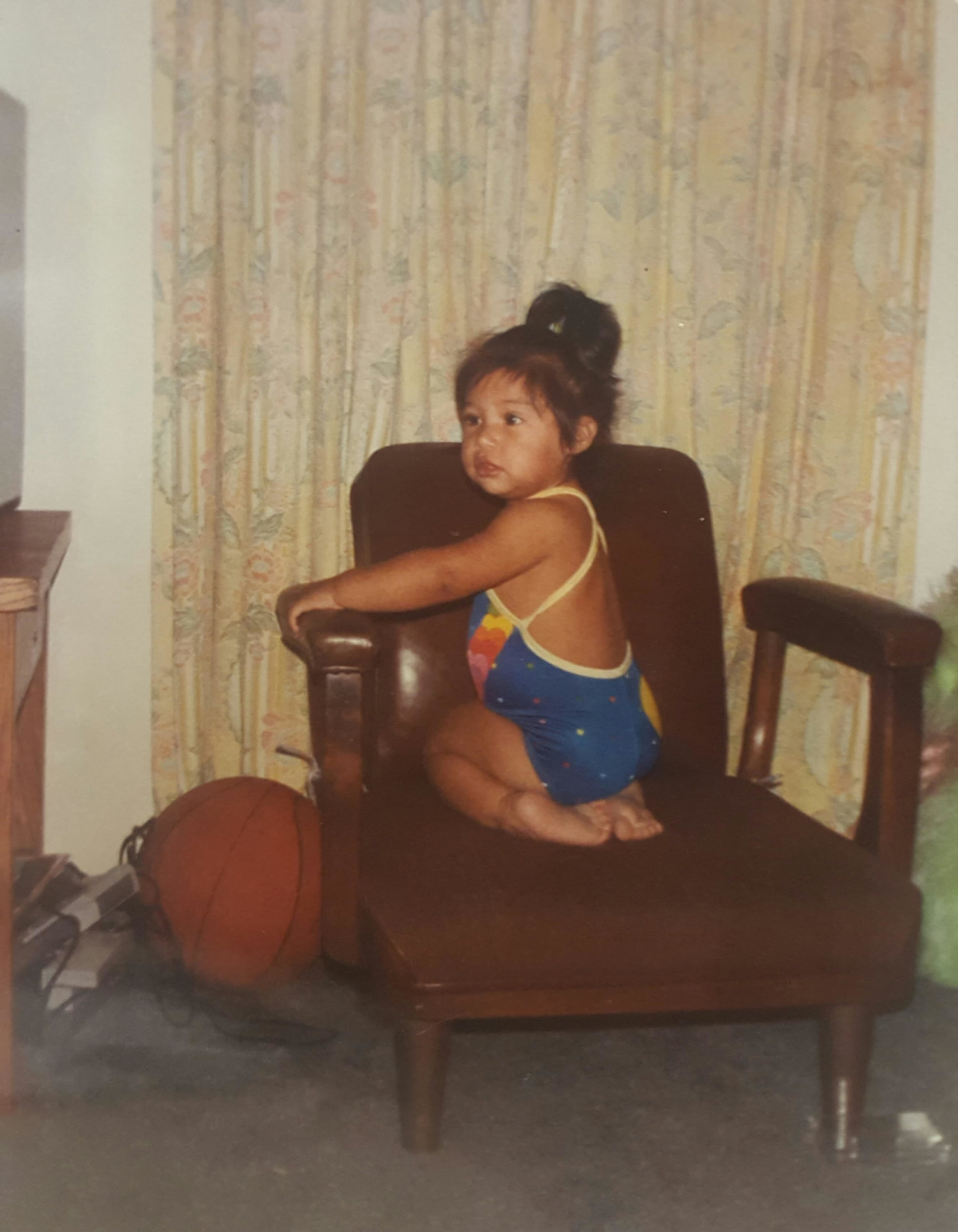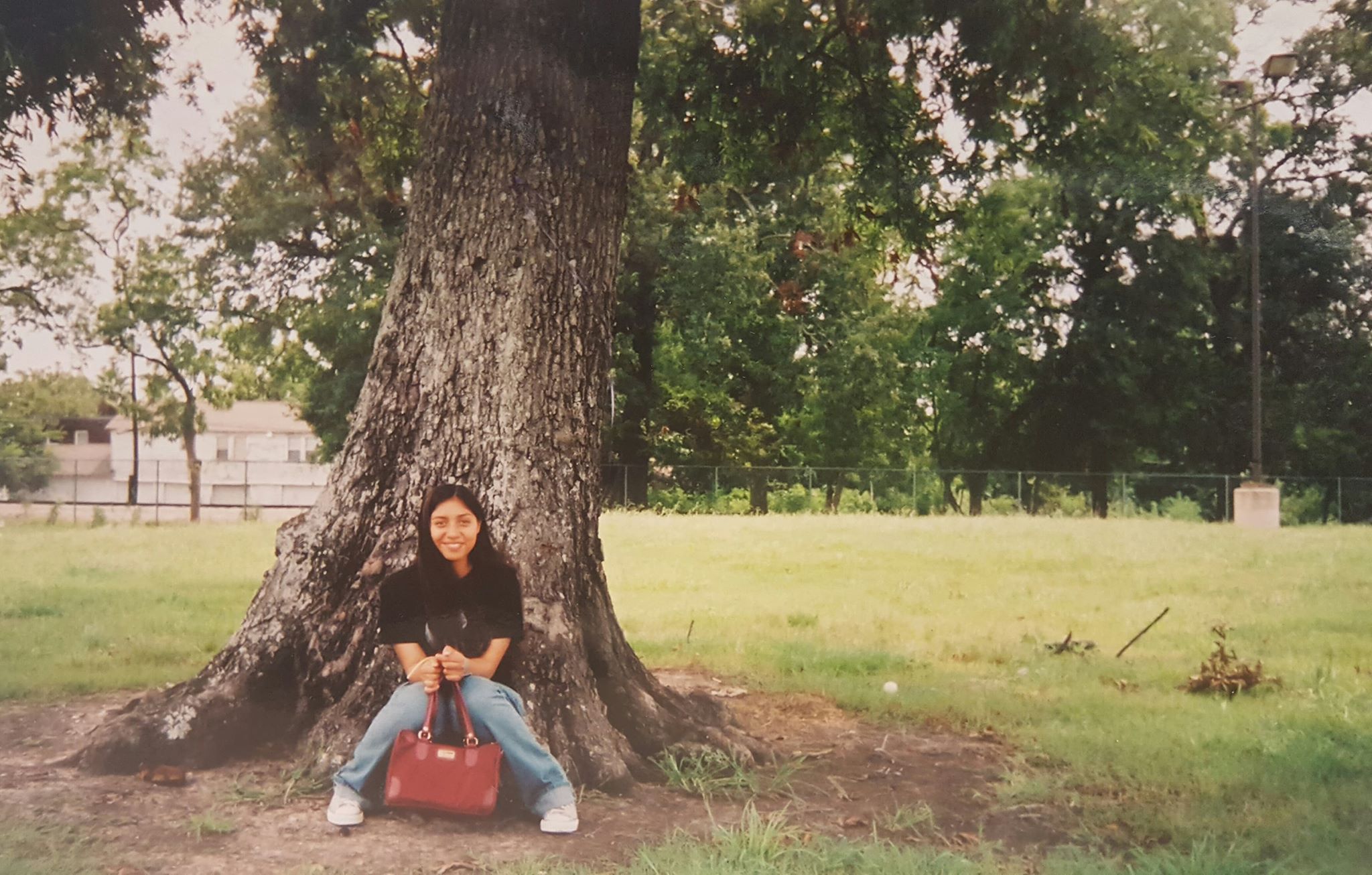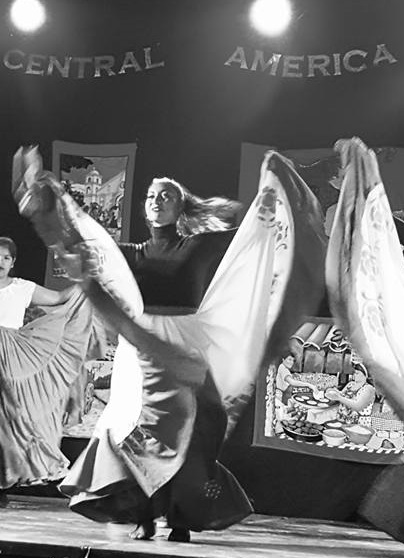A Story With No Beginning And No End
By Jessica Alegría


Jessica Alegría as a child
Part I
I come from Kuskatan. Today they call it El Salvador. My ancestors were either Pipil or Lenca or maybe even Maya, we’re not sure. I undeniably have Spanish ancestry. In 1524 Pedro de Alvarado, sent by Hernán Cortés, arrived in the area with the intent to colonize it and faced indigenous warriors. Today, most Salvadorans identify as mestizo, at least on paper. This cultural mix complicated things for me growing up: a culture that was out of reach.
My parents held multiple jobs when I was a child. We didn’t often share meals together because my siblings were older and my parents were overworked. The times we sat at the dinner table have remained in my memory as the most cherished childhood experiences. It was a sacred space.
These were the times papi would tell us stories; some of them were scary like when he saw la Siguanaba or when he had to sleep in the cemetery back home. Sometimes they were funny, like the one about him getting himself trapped in the bull pen. Some were about the war—who was killed, how, and what for. The ones about la guerra never quite seemed to have real endings. Luckily for me and my siblings, my mami and papi were skilled in guiding us out of war and our safe space was never broken, instead we would be laughing again before we knew it. I learned that laughter ties trauma and healing. I also learned sitting at the table about who I am, how to listen, and what my role in the family is. “Remember how good jocotes are?” my parents would ask with certain nostalgia to each other. “I love jocotes!”, I’d say not knowing what they were or pitayas, nances or marañones. “You weren’t there, you’re lucky,” my older sister would tell me. I wasn’t sure if that was true. I only knew I wasn’t part of their story.
Part II


Jessica Alegría, age 16
The past always returns. 1932, la Gran Matanza happened in El Salvador. Thousands of indigenous people were killed by the Salvadoran government and violence continued. They were targeted for their traditional clothing, language, and ways of life. Many renounced or hid who they were to survive. My father remembers hearing Nawat being spoken as a child but less so as he got older. None of my grandparents spoke it.
My mother’s acknowledgment of ancestry is spoken through a recognition of God: “My prayers protect you wherever you go, my mother prayed for you before you were born.” Her religion is colonial. This is sometimes difficult for me. Her spirituality, however, is distinctly hers and rooted in universal justice and so she has a unique way of expressing her understanding and experience of God. Sometimes she begins by preaching a bible verse and ends with critiquing capitalism. She weaves anecdotal narratives of God, culture, power, and politics beautifully providing a sense of comfort. Her truths have a way of making the essence of intimidating forces familiar like her sopa de pollo. Her way of being gives my life a magical realist touch. Miracles can be counted upon in the most difficult of times.
Papi says it’s okay to be shocked when injustices happen but never to be surprised. Do not be shell-shocked, he says. Keep moving.
Civil war happened and my parents emigrated to the United States after realizing it was hopeless for them to try to raise my siblings in El Salvador. Having no money meant separating the family so they left my siblings there until my parents had saved some money in Texas. A coyote was paid a second time and my siblings made the journey swimming across el Río Grande. Now they were undocumented. My mom worked overtime and was paid under the table. My dad was detained and deported and made the journey once more. It was after this second time that he met me, a newborn.
Growing up, I heard stories about the war. It’s strange to hear them within the confines of a safe place. I felt anxious and fearful, nonetheless. Perceptions get you. The people I loved the most had witnessed deceit, torture, and killings on behalf of peers so my parents raised us to be independent and the concept of community was nonexistent. Community is something I wish I understood better but at the same time I’m grateful for the space I grew up in. That environment taught me self-reliance, who and when to trust, and how to confront psychological and interpersonal violence.
As I got older, I realized that not all Spanish-speaking kids’ parents were displaced. Some parents had attended university and came to Canada to be professors or doctors. I realized that some white kids and their families had escaped conflict in their home countries too. I always felt more at ease with them.
Part III
I am an adult now. I have begun untangling culture from trauma. My dad’s angry reactions when I was a child perhaps had to do with his own trauma affecting his ability and desire to raise a child in a healthy way.
Perhaps my mother would be a different person if she had been given the opportunity to define herself as a person and woman before getting married and having a family.
Perhaps my siblings and I could have learned to express ourselves better, to be less guarded, and to be more open to new experiences.
Perhaps we can be now.
Perhaps it’s a simple fear of change that won’t let me but it feels more important than that. Perhaps it would be a betrayal to my parents, to their teachings, to our roots.
Part IV
I have come to understand I’m not responsible for all the intergenerational pain passed down to me.
This trauma has purpose:
I am the actions, hopes, triumphs, and pain of my ancestors.
I reject the pressure of healing 600 years of suffering in one lifetime.
My understanding of intergenerational healing is key to my own understanding of culture: if healing is a process then so must be culture.


Age 29, performing a cumbia, Saskatoon
Part V
When I recognize this as my history, I ask myself, What is my culture? Can it withstand the fluidity of my experiences and identities? What is culture within these physical and psychological borderlands? What are the sacred material objects of a diaspora? Where do we worship? Where is home? Is there culture without one? Is there culture without identity? Are reclaiming culture and claiming my true self mutually exclusive?
Part VI
My culture is knowing the password the coyote gave to my grandmother to hand over my siblings. It’s knowing what detention center my parents were held in when they were caught crossing the desert and learning how love was expressed in that place.
“The men had to wear orange so we would say we love our zanahorias,” my mother recalled the conversations with other women in her ward laughing.
My culture is learning to pray on the bathroom floor. A culture of faith and ideals rooted deeply in my blood, nerves, hair, bones.
My culture is my mother telling me “no tenga miedo” at the most critical times in my life: mental breakdowns, dropping out of college, burning the masa, and every regular heavy day. “No tenga miedo, you are made of prayers. You are always protected. Dios está siempre con ustedes y cuando yo me vaya los cuido desde allá,” she says.
I have always believed her.
***
For more Stories From El Salvador, visit their site here. If you want to share your own story, contact them here. You can follow the group on Instagram @storiesfromelsalvador or on Facebook.


